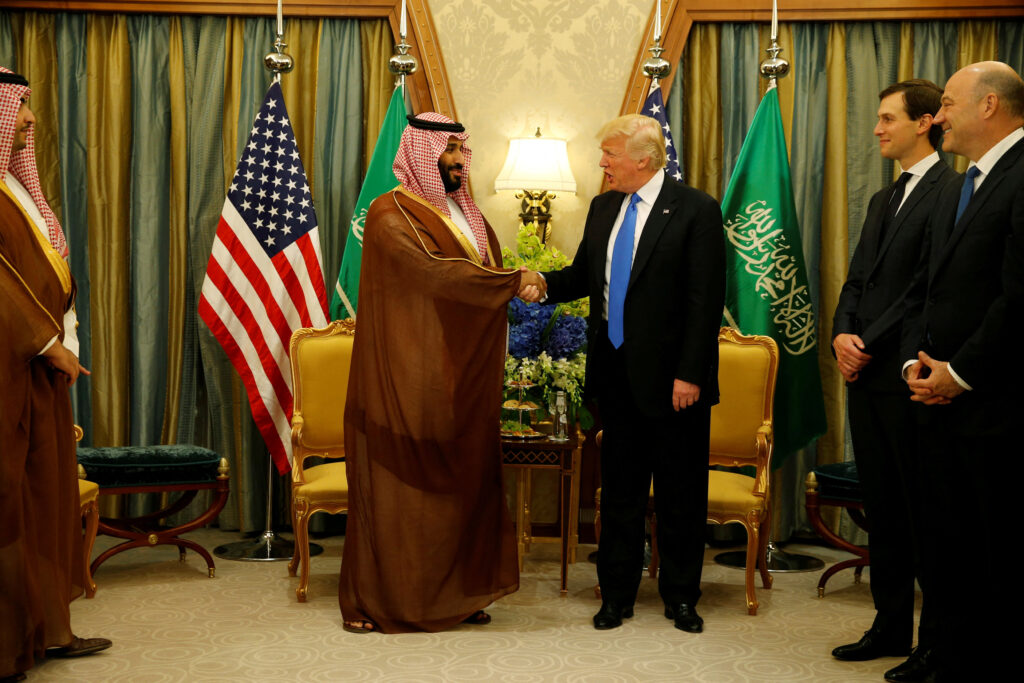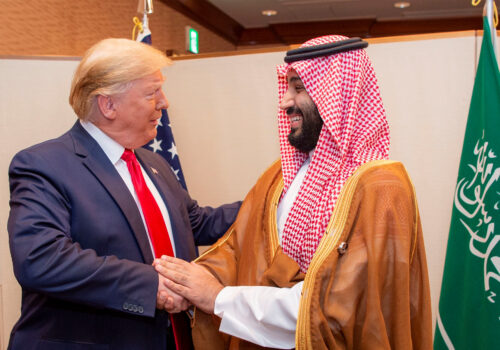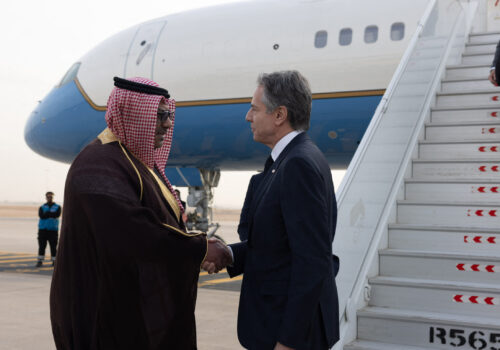Since the second Trump administration took office, Middle East policy experts and commentators have renewed discussion of a potential US-brokered Saudi Arabia-Israel normalization deal. The broad parameters of such a deal, which had been under discussion during US President Donald Trump’s first term and during the Biden administration, are generally known. Riyadh would agree to normalize relations with Israel in exchange for US security guarantees, preferably in the form of a treaty; US assistance with the kingdom’s nuclear program; cooperation on technology, including artificial intelligence; and progress on Palestinian statehood—although precisely how much progress would be required remained unclear. The term “pathway” to a Palestinian state—sometimes qualified as “credible” or “irreversible”—was the most consistently used formulation.
With Trump now scheduled to visit Saudi Arabia next month, the issue of normalization is certain to be on the agenda. There are three reasons why Crown Prince Mohammed bin Salman, Saudi Arabia’s principal decisionmaker, should make full Palestinian statehood part of the asking price for normalizing relations with Israel. First, many Saudis and other Arabs throughout the region may look askance at bin Salman if he were to be seen as ignoring the Palestinians’ plight. Second, if he pulls it off, he will have succeeded where other, more celebrated Arab leaders failed. And finally, the longer the issue remains unresolved, the more it will continue to impede progress on Saudi and regional priorities.
Then and now
Before the Gaza war began in October 2023, Riyadh may have been close to an agreement on official diplomatic relations with Israel without the precondition of a Palestinian state. But Israel’s punishing assault on the Gaza Strip, after Hamas’s rampage through southern Israel on October 7, 2023, seems to have changed Saudi thinking. Speaking at an Arab League summit last year, bin Salman called the Israeli military campaign in Gaza “genocide.” And in a speech in September, he indicated that Saudi Arabia would not establish relations with Israel without the creation of a Palestinian state.
Although Israeli Prime Minister Benjamin Netanyahu has sought diplomatic relations with Saudi Arabia in an effort to develop contacts across the Muslim world, he remains staunchly opposed to a Palestinian state. In 2021, Netanyahu described the Abraham Accords—Israel’s normalization agreements with Bahrain, the United Arab Emirates (UAE), Sudan, and Morocco—as enabling Israel to replace “the old and dangerous doctrine of territories in exchange for peace and brought peace in exchange for peace, without giving up a single inch.”
Past failures
The term “pathway” to Palestinian statehood joins a variety of other phrases from past peace plans that included an unfulfilled Palestinian component. Egyptian President Anwar Sadat believed that he had secured “autonomy” for the Palestinians when he signed Cairo’s 1979 peace treaty with Israel. Palestine Liberation Organization Chairman Yasser Arafat believed he was gaining Palestinian “self-government” when he signed the 1993 Declaration of Principles. Jordanian King Hussein bin Talal agreed to the 1994 Israel-Jordan peace treaty only after he was convinced the Palestinians had gained a “political horizon”—the derisory catchphrase of the Oslo process.
However, Palestinians’ autonomy, self-government, political horizon, independence, or peace with Israel never materialized; extremists on both sides undermined the deeply flawed Oslo process and subsequent negotiations. After 1994, further Israeli treaties with Arab countries did not materialize until the 2020 Abraham Accords, purchased for Israel by US concessions to the Arab signatories and conspicuously silent on the resolution of the Palestinian issue. Arab participants saw the Abraham Accords as a means to receive concrete US commitments.
When the UAE signed the first Abraham Accord in September 2020, it was primarily to gain participation in the US F-35 fighter program and access to US armed Reaper drones, over Israeli objections, as well as the understanding that Washington would prevent Israel from annexing portions of the West Bank, which Jerusalem was about to do. In exchange for their respective normalization deals with Israel, the United States recognized Morocco’s sovereignty over Western Sahara and removed Sudan from its list of state sponsors of terrorism.
Saudi considerations
Saudi Arabia is now setting its own price for an agreement. However, bin Salman should take note of two features of past Arab agreements with Israel. First, Israel has never entered into any agreement that explicitly called for Palestinian statehood. In fact, some pro-Israel observers in Washington are trying to identify a “rhetorical formula” that would satisfy Saudi demands without committing Israel to a Palestinian state. Second, the United States, despite its stated desire for a resolution to the Palestinian-Israeli conflict, has never pressured Israel on Palestinian statehood, limiting itself to hollow rhetoric about supporting a two-state outcome.
Bin Salman reportedly told US leaders that he cares little for the Palestinians and does not want the issue to impede plans to diversify the Saudi economy or to discourage Iranian threats to his realm. However, the Gaza war—which has left over fifty thousand Palestinians dead, including tens of thousands of Palestinian civilians, televised in bloody detail by Al Jazeera, may have forced a change in bin Salman’s calculus about what is politically realistic. “Seventy percent of my population is younger than me,” the thirty-nine-year old crown prince reportedly told then US Secretary of State Antony Blinken in 2024. “For most of them, they never really knew much about the Palestinian issue. And so they’re being introduced to it for the first time through this conflict.” An Arab Center for Research and Policy Studies (ACRPS) poll conducted in Saudi Arabia and published in February 2024 indicates that the share of the Saudi population opposed to normalization with Israel grew from 38 percent in 2022 to 68 percent in 2024.
The Trump administration may insist that Saudi Arabia relax its demand for a Palestinian state prior to a normalization deal, possibly by emphasizing other benefits bin Salman can expect. Also, the administration may, as Trump attempted in his first term, designate Palestinian municipal control of islands of Palestinian communities on the West Bank as a “state” and demand that bin Salman accept it as such.
But if bin Salman makes peace with Israel without a Palestinian state that most of his citizens believe to be credible, any Israeli action against the Palestinians, or other Arabs, will be his to justify. For example, in Gaza, apart from the high casualty numbers, massive infrastructure destruction, and the dislocation of 90 percent of the strip’s population, a United Nations Human Rights Commission report published last month states that sexual violence has become “standard operating procedure toward Palestinians” in the Gaza conflict and is “committed either under explicit orders or with implicit encouragement by Israel’s top civilian and military leadership.” This is the very leadership with which bin Salman would be reaching a normalization agreement.
Additionally, Israeli violence directed at West Bank Palestinians is growing. This has included assaults from Israeli settlers, the destruction of property, and expulsions, not to mention Israeli military offensives, in which Palestinian civilians are the inevitable victims. Bin Salman would also have to contend with Saudi public opinion regarding Israel’s capture of more Syrian territory, its strikes against Lebanese territory after a cease-fire has been concluded, and the increasing discussion of ethnic cleansing of Palestinians.
At present, bin Salman can comfortably join his people, regional Arabs, and the international community in condemning reported Israeli violations of the norms of war and peace. While other Arab regimes have survived peace with Israel, they did so despite the wishes of their populations, not because they made a convincing case for peace. The political risks of normalization are also exemplified by the assassination of Sadat by Islamic extremists, in part because of his perceived betrayal of Arab and Islamic causes in signing a peace agreement with Israel.
In last year’s ACRPS poll, the majority of respondents from countries whose governments have already signed agreements with Israel—including Jordan, Egypt, Morocco, and Sudan—oppose their countries’ normalization with Israel. Other Arab countries such as Oman and Qatar, which have informal ties to Israel, continue to refuse normalization until Israel ends its occupation of Palestinian territories.
Bin Salman may be drawn to the idea that he can achieve something that past regional leaders like Sadat, Hussein, and Arafat, as well as current Arab leaders such as Muhammad bin Zayed of the UAE failed to accomplish. Demanding a Palestinian state may also be a means to distinguish himself from the Arab signatories of the other Abraham Accords, all of whom prioritized their respective national ambitions and did not press for progress on the Palestinian issue. Bin Salman must also consider the ability of regional malefactors such as Iran and radical Islamists to exploit the unresolved Palestinian issue to impede political, security, and economic progress for Saudi Arabia and the region. The ongoing Houthi campaign of attacks against Red Sea shipping, for example, would not be happening without the Gaza war, itself an extension of the unresolved Israeli-Palestinian conflict.
Costs and benefits
While Israel has legitimate security concerns, its continued occupation of Palestinian territories, its war in Gaza, and growing violence in the West Bank are creating a pronounced line in the sand between nations that have peace treaties with Israel and those withholding formal relations. While there are Arab governments on both sides of this line, their publics, including the Saudi people, are overwhelmingly opposed to normalization with Israel.
Bin Salman needs to weigh popular Saudi and other Arab views, as well as the regional instability that the continued Palestinian-Israeli conflict engenders, against any benefits he anticipates from a formal peace with Israel. Then, he needs to decide on which side the kingdom benefits most. If he were to settle for equivocal language about a “pathway,” as opposed to an actual state, the history of Arab-Israeli peacemaking suggests bin Salman would join Sadat, Arafat, Hussein, and others who failed to use their diplomatic leverage to press for Palestinian statehood.
Amir Asmar is a nonresident senior fellow with the Scowcroft Middle East Security Initiative at the Atlantic Council’s Middle East programs.
Further reading
Thu, Mar 27, 2025
A US-Saudi deal without Israel? Here’s what the US should ask for.
New Atlanticist By Kirsten Fontenrose
Trump could deliver a stronger security agreement with Saudi Arabia that includes the hefty asks from the kingdom without normalization with Israel. But should he?
Fri, Dec 13, 2024
To advance Saudi-Israeli relations, let the private sector lead
MENASource By
With the right policies in place, the US private sector can play a critical role in advancing US-Saudi-Israeli economic relations, creating a reality that will make normalization more achievable in the coming years.
Thu, Feb 22, 2024
The future of Saudi-Israeli relations is a balancing act between Palestinian and regional interests
MENASource By R. Clarke Cooper
Any credible movement to formalize bilateral relations between Riyadh and Jerusalem cannot ignore what the Saudis have consistently stated about the two-state solution.
Image: US President Donald Trump meets with Saudi Arabia's Deputy Crown Prince and Minister of Defense Mohammed bin Salman at the Ritz Carlton Hotel in Riyadh, Saudi Arabia May 20, 2017. REUTERS/Jonathan Ernst.



